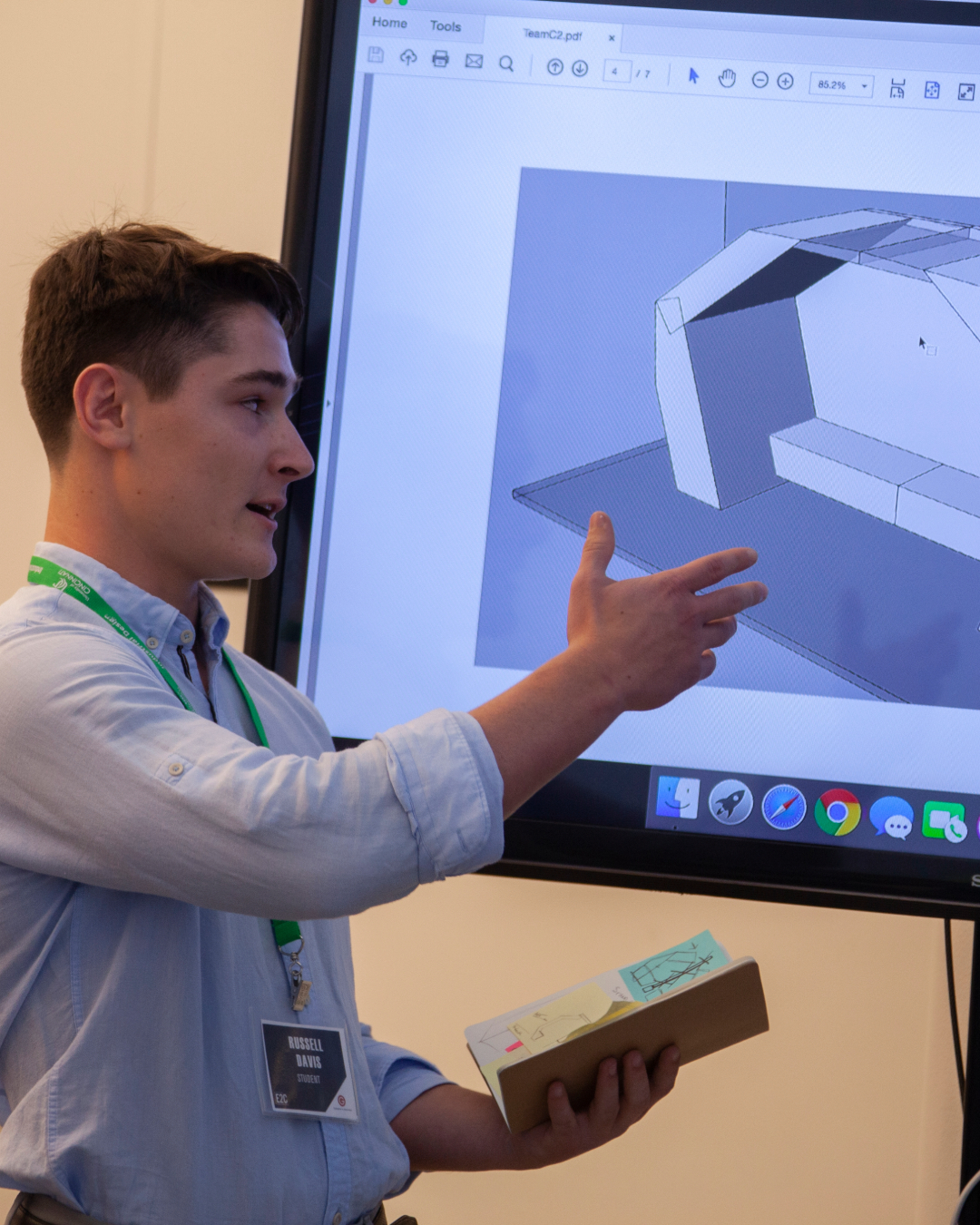College Life
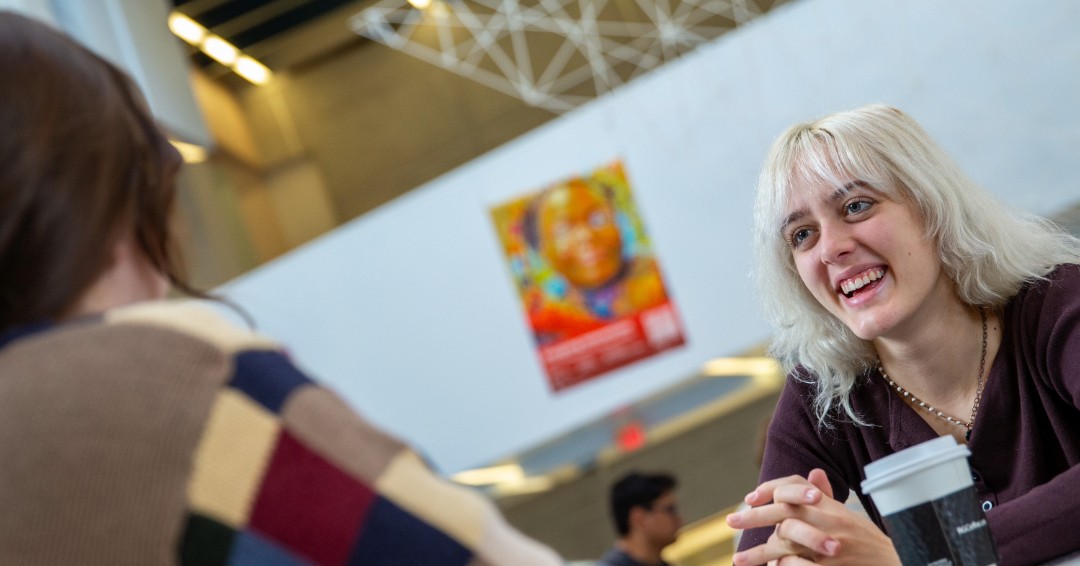
Welcome to the College Life section of our Major Decisions blog, a space dedicated to answering all the questions, comments, and concerns you might have as you navigate your time at DAAP and your experience at the University of Cincinnati.
Whether you're wondering what to expect during your first year, how to balance studio work with campus life, or where to find support whenever you may need it, this is where we break it all down. Think of this as your go-to guide for living, learning, and thriving as a Bearcat.
The University of Cincinnati offers more than 600 student organizations, including everything from professional societies and cultural clubs to groups related to specific majors. Getting involved is one of the best ways to enhance your college experience, both personally and professionally. Student organizations complements your academic journey, from building friendships and leadership skills to boosting your resume and just having fun.
To help get you acclimated to what you can expect, we've gathered some commonly asked questions about student organizations below.
What types of student organizations are available at DAAP?
We have several DAAP related organizations available. This includes (but not limited to) DAAP Tribunal (Student Government for DAAP students), Community of Art Students, Design for America, and DAAPcares.
You can explore the full list of student organizations at GetInvolvedUC to see how many align with your interests.
How can a student get involved?
There are several ways to get involved. The list of student organizations on GetInvolvedUC includes contact information, meeting days, times, and locations, as well as links to social media accounts where you can see how active each organization is and the types of events they host.
During College Day, DAAP hosts an organization fair as part of the college session that all incoming students are invited to attend. Additionally, students can explore other organizations during Welcome Week at the beginning of fall semester or later in spring semester.
How much of a time commitment is involved?
The time commitment varies for each organization. It's recommended that students choose one or two organizations to focus their time and energy on. It's more beneficial to take on a leadership role in one organization rather than being a member of several.
Can I start my own organization?
Absolutely, you can start your own organization! That's how many student organizations began at UC.
Are there any other suggestions or tips?
We recommend joining a student organization that you’re passionate about and that will help you grow both personally and professionally. Look for a group of people you admire or want to learn from. This is a great time to explore who you are and, most importantly, have fun!
As new UC Bearcat, most students are required to apply for dorm living during their first year. This transition can be a big step for many, as they learn to live independently in a community filled with their peers. Here are a few tips and important information to keep in mind when navigating dorm life.
Looking for Roommates
There are many ways to find a roommate. With social media’s popularity, many incoming students can connect with others who are also searching for roommates, or they simply want to make new friends. Instagram and Facebook pages are designed for incoming students to submit a post about themselves, share hobbies, expected major, goals for college, and even a need for a roommate. You don’t need to post on these pages yourself – feel free to browse and find someone with similar interests or the same major, then connect with them through social media. When looking for a roommate, it’s crucial to ask specific questions about schedules, lifestyles, and expectations to ensure a successful living arrangement.
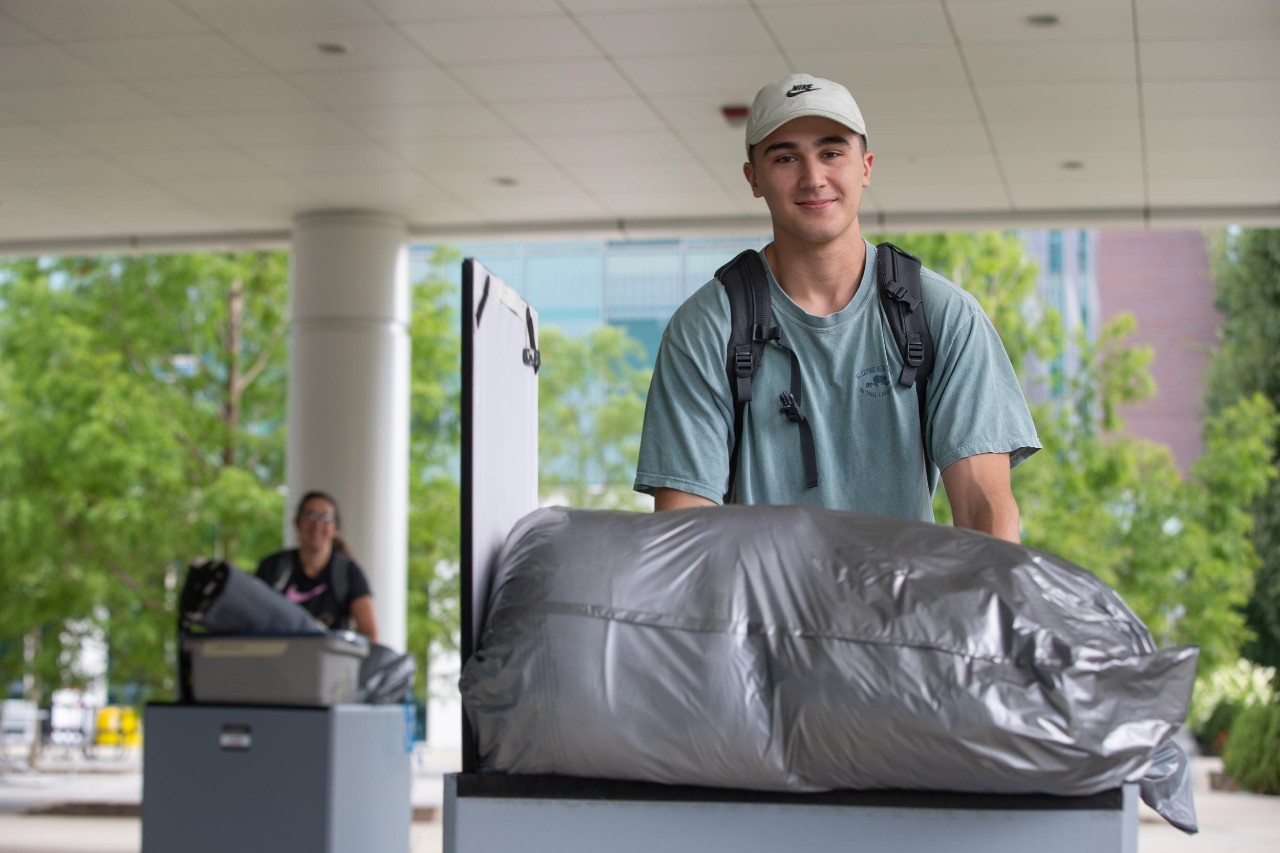
For some incoming students, they may feel more at ease living with someone they already know, such as a friend or a classmate. It can feel better to communicate with someone you have an established relationship with, especially in a new space. When living with a friend or previous classmate, it’s important to communicate effectively about the transition from friends to a roommate and friend. It’s a huge change for your friendship because you will be with each other every day. Communicating is crucial and allows you to set expectations to create a thriving living environment.
Looking for a roommate can be a bit overwhelming, especially when you’re pressed for time. When applying for housing through the UC portal, you have the option to be paired with a random roommate. Being randomly assigned a roommate gives students the opportunity to build a brand-new relationship from the ground up. It’s a chance to start fresh and form a friendship based on open communication and shared experiences.
Having a roommate may not be ideal for some students. UC offers a single room living option for students who feel more comfortable living by themselves. Some dorm halls offer these rooms while still providing a community experience. Each dorm floor has a Resident Advisor (RA), typically a third- or fourth-year student responsible for supporting and guiding the residents on their floor. RAs help create a safe and welcoming community by organizing monthly meetings and activities in the shared common areas. These events encourage students to connect with one another and help build a strong, positive bond among those living together.
DAAP Living-Learning Community
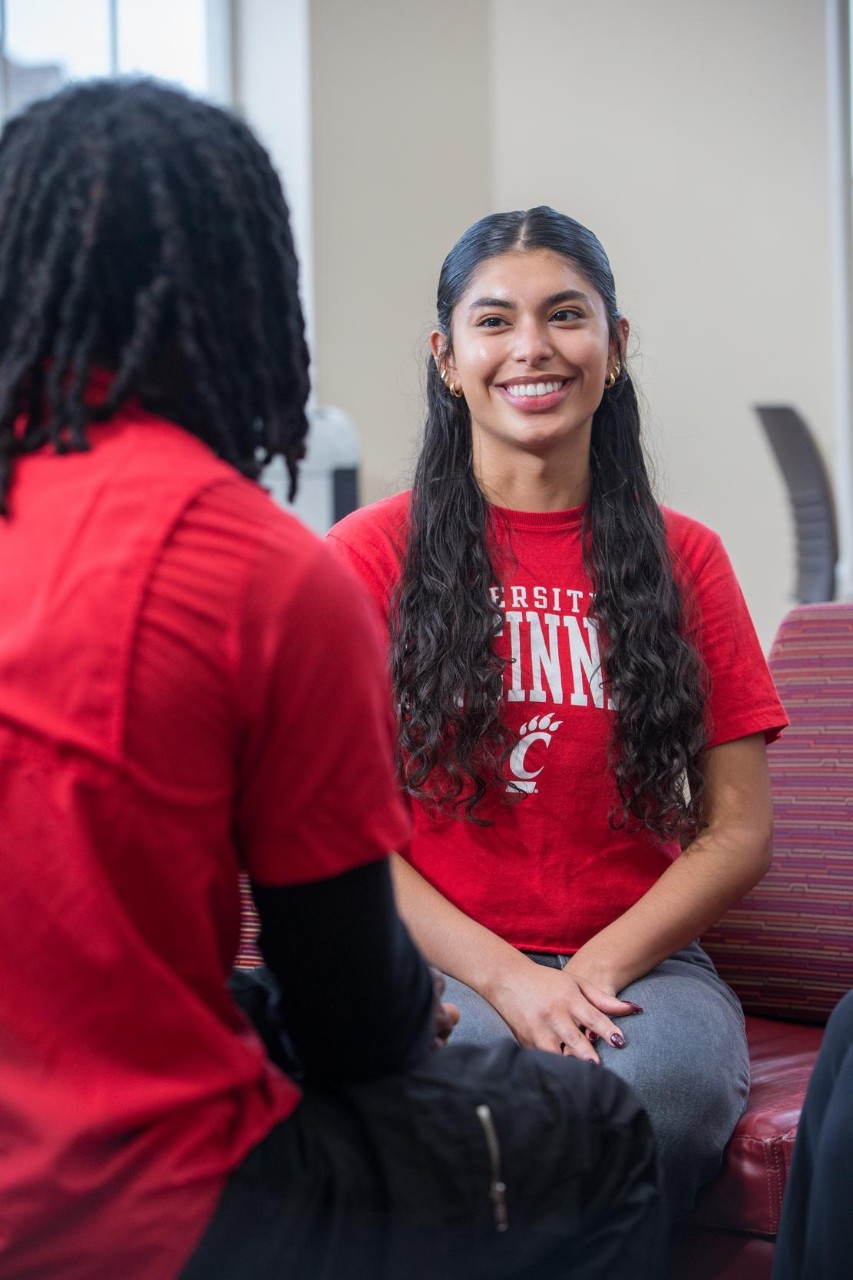
All colleges at UC provide a living-learning community (LLC) for students to connect with others also majoring in the same program. Living with other DAAP students gives students an opportunity to live with peers who have related interests and course loads. It offers a positive environment and promotes engagement between students who share a similar experience. A living-learning community also provides various workshops and programs for DAAP students to support their academic and personal growth. They offer ways to network and connect with the faculty and staff outside of class. DAAP is full of creative and talented students, living in a community encourages students to share and build off each other's talents.
To live in the DAAP living-learning community you must be a first year DAAP student and a roommate must also be a first year DAAP student. Students will live on a designated floor in Daniels Hall and attend events designed for students in the community to build a strong unity.
As part of the housing application process, you’ll need to answer a few questions about your interest in living in a living-learning community like why and what you hope to contribute.
Housing Application Process
In January, students receive access to the housing portal to submit their application and desired dorm hall assignments. First year students living outside a 50-mile radius of the campus are required to live in university housing. Students who live within the radius can choose to commute to campus.
At the beginning of the housing application, students will provide and verify general information such as their name, date of birth, previous address, and other basic details. The meal plan selection process will also take place during the housing application. First year students are required to select the all access meal plan; starting their second year, students can choose a different meal plan with limited swipes. Students have until early May to submit the housing application. If you submit the application after the deadline, you will still be eligible for on-campus housing, but you might be waitlisted.

Housing assignments will begin to be announced mid-July. The dorm hall/apartment style options that students can be placed into include, Calhoun, Campus Recreation Center, Dabney, Daniels, Marian Spencer, Morgens, Schneider, Scioto, Siddall, Stratford Heights, Turner, U Square, and University Park. Each dorm hall surrounds the campus, allowing students to have immediate access to the university.
Before moving into your new dorm, students must reserve a move-in date and time. Students can begin selecting an available move-in time in late July. The time slots are typically set a week in advance of the first day of scheduled classes. This allows students to find a time that works for them and their family/friends who will be assisting them with the moving process.
Transitioning into Independent Living
Transitioning to independent living in a new environment with a roommate can be a significant adjustment for some students. People are moving to UC from all over the world. It's important to create a healthy routine and develop skills necessary to manage your new home.
Creating a healthy routine encourages success academically and personally. For example, it's important to be on time for class every day. Setting an alarm every morning around the same time creates a habit of getting up early. You may also want to make sure you have enough time in the morning to get ready and eat breakfast to limit the feeling of being rushed. Blocking time each day to complete class assignments and study for upcoming exams or quizzes helps build a strong foundation for academic success, as well. But don’t forget to add a social element into your routine. Try stepping out of your comfort zone. Answer questions in class, join a club or an intermural sport, or participate in activities offered by the university. UC provides countless opportunities for students to build connections, such as offering movie nights at Nippert stadium.
Dorm Life Perks
The dorm life includes numerous benefits for students during the transition into college.
- Convenient location - Dorms are located on campus allowing students to have easier access to their classes, dining halls, libraries, campus facilities, and other resources.
- Social life – Living in a dorm provides many opportunities for students to meet new people and create friendships.
- Residential Advisors (RAs) – Your RA is there to guide you through the college transition process. They strive to make you feel welcome and are always there to help you when needed. Your RA is another outlet of support and is just right down the hall ready to answer any questions you may have.
- Independence – Dorm living is a great way to introduce you to the adult world with ease. Students can create their own routine and learn new skills needed for when they make the transition out of college.
Community – Many incoming students are going through a similar experience. Campus living uplifts community growth and belonging.
Beyond the walls of DAAP, Cincinnati is home to a vibrant culture, full of art, and bold designs. There is an artistic presence on every corner of the city, including beautiful murals (some even made by DAAP students, faculty, or alumni). Numerous public museums invite visitors to explore impressive exhibits and curated collections. Cincinnati is a dynamic art community where creativity and passion thrive.

As a prospective student considering your options, choosing a college with a neighboring art scene can greatly enrich your educational experience by:
- Sparking creativity and new ideas.
- Providing opportunities to connect and network.
- Getting involved with local events.
- Broadening perspectives and understanding.
The Reed and Meyers Galleries
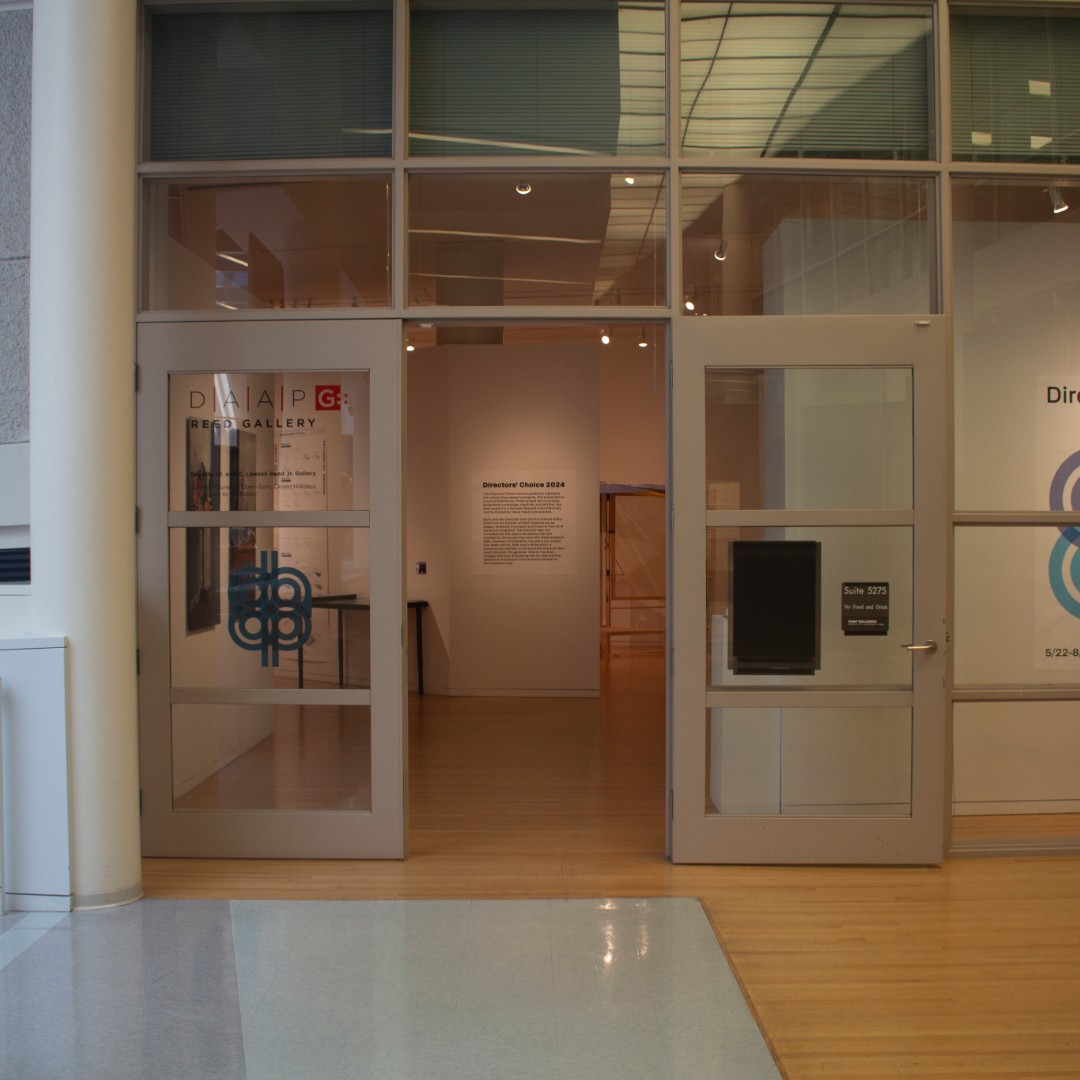
Both the Reed and Meyers Galleries can be found on the University of Cincinnati campus and are dedicated to highlighting the work of practicing professionals, DAAP students, and faculty. The Reed Gallery, situated within the DAAP building, serves as a space for students to explore the artwork of other students, faculty, and local artists. The gallery also focuses on engaging students in conversation about different art media. The Reed Gallery is the largest DAAP gallery devoted to promoting the colleges' creations. Exhibits feature a broad range of art styles, representing all DAAP programs. The Reed and Meyers Galleriesy areis managed by current students, giving them the opportunity to gain real-world work experience. The Meyers Gallery is located on the University’s main street, encouraging the UC community to engage with DAAP. This gallery aims to educate the public about DAAP’s work through various exhibits. It also ensures that all students have access to a variety of art styles. The Meyers Gallery is also staffed by current students who are committed to teaching others about art.
Cincinnati Art Museum

The Cincinnati Art Museum features over 73,000 unique artworks, showcasing a variety of styles and historical eras. There are always new exhibits to check out, giving visitors a chance to explore different cultures and artworks. The museum offers free general admission, making it a budget-friendly experience. Located in the scenic Eden Park, it provides a beautiful environment that encourages guests to explore the park and its scenery. The museum also offers a range of educational opportunities, such as workshops, special events, artist talks, and features a research library on site.
Contemporary Arts Center

The Contemporary Arts Center (CAC) is a gallery that invites exploration and conversation about cutting-edge art. The building, designed by Zaha Hadid, is its own remarkable piece of art. With free admission, the CAC is accessible to everyone. The CAC presents a rotating collection of exhibits that highlight a wide range of contemporary art, including paintings, sculptures, and performances. Additionally, The CAC offers various interactive programs, such as workshops, speakers, and events that promote engagement with the arts. Educational resources and tours are also available for visitors looking to dive deeper into the CAC. Every spring, the Contemporary Arts Center also hosts a special exhibition showcasing the thesis projects of graduating Master of Fine Arts students.
Cincinnati Museum Center
The Cincinnati Museum Center provides an exciting chance for visitors to explore history, science, and culture through its many exhibits and attractions. Inside the museum, guests can find the Cincinnati History Museum, the Museum of Natural History and Science, and the Children’s Museum. There are plenty of interactive exhibits that let guests engage in the experience. Throughout the year, many special exhibits are open for visitors to explore outside of the regular museum offerings. The museum also features the OMNIMAX Theater that provides a captivating cinematic experience. The museum is located inside the Union Terminal, a National Historic Landmark famous for its architecture and design.

Credit: Chris Dobbs & The CMC Blog
BLINK

Credit: Greater Cincinnati Foundation
Every other year, Cincinnati and Northern Kentucky host a large public art festival that features interactive light sculptures, light installations, projection art, murals, and so much more. BLINK is known as the largest immersive experience in the country and is free for all to attend. It is designed as a walking experience, encouraging visitors to explore the city and installations. The festival showcases work by artists from all over the world. Discover many murals, buildings, and historic landmarks from a new perspective as they come alive with animation and light. Spanning over four days, this event allows enough time for exploration. DAAP students and faculty are actively involved in the BLINK festival, contributing to many of the installations and projections.
Summer Fair

Credit: Shae Combs
The Cincinnati Summer Fair is a wonderful opportunity for guests to experience a mix of art, food, and music. It’s a fantastic way to support local artists and check out their works available for sale. The fair helps raise funds for local artists and art-focused organizations. There are also opportunities for grants, scholarships, and awards. This year, three DAAP students won the emerging artists scholarships for their work.
Each artwork is uniquely crafted, giving visitors a chance to appreciate a variety of artistic styles. It has been a tradition in Cincinnati for more than 50 years, making it one of the longest running art fairs in the country. The event lasts for three days and is located at Coney Island. The event invites guests to explore all of its offerings, including sculptures, photography, paintings, wood designs, metalwork, jewelry, and much more. Plus, there’s fantastic live music and a wide range of food options for visitors to enjoy.
Wave Pool
Wave Pool, located in Camp Washington, is a contemporary arts center focused on building community. It is a space that supports local artists and is dedicated to encouraging creative projects, exhibitions, and collaboration. Wave Pool offers arts residency programs that equip artists with studio spaces, resources, and support from the community. They also provide programs such as classes in woodworking and ceramics, offer free meals to the community, and the Welcome Project, which helps refugee and immigrant artists. Through art, Wave Pool connects with the Cincinnati community, promoting creativity while tackling real-life problems. The Wave Pool is open to everyone who wishes to participate in community-based projects and programs, striving to support all artists.
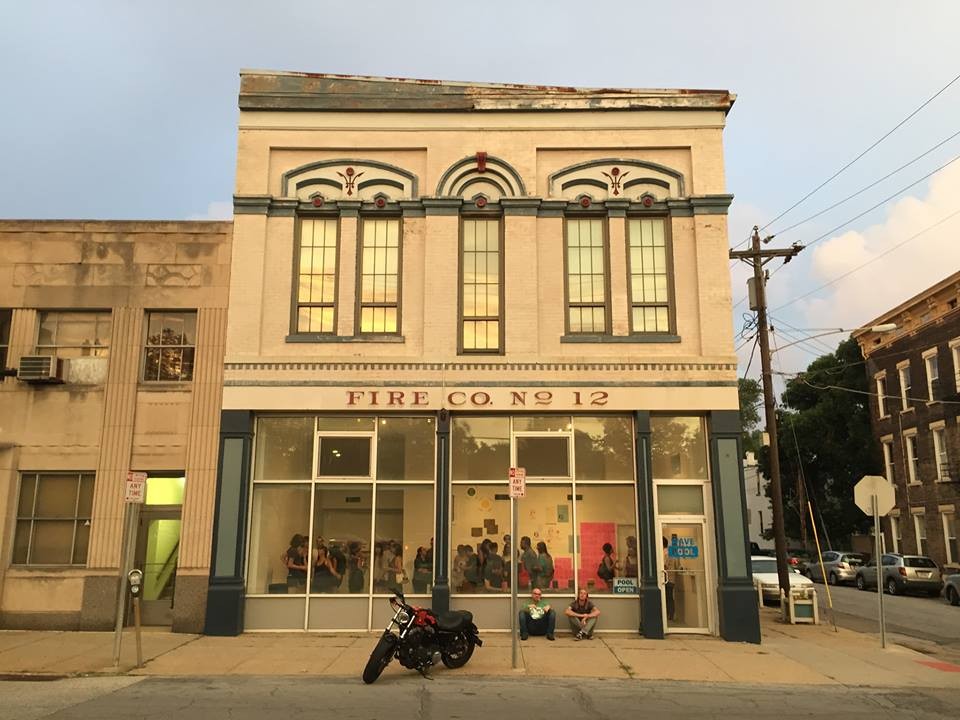
Credit: cincyae
Clay Street Press

Clay Street Press is a printmaking studio and gallery located in the Over-the-Rhine neighborhood. They focus on printmaking, allowing artists to produce prints through various techniques and media styles, including etching, woodcutting, and silkscreen. The space also acts as a gallery that features printmaking made by both the studio and other artists. Visitors are encouraged to explore the range of printmaking works and the techniques that go into creating these beautiful pieces of art. Founded in 1981 by Mark Patsfall, a DAAP graduate, the studio has seen collaborations with numerous well-known artist and celebrities. Mark aims to educate others about printmaking and all the work that goes into these creations.
Taft Museum of Art

Credit & Creator: Ryan Kurtz
The Taft Museum of Art offers an interactive experience for visitors, hosting an impressive art collection in a historical environment. The museum is a National Historic Landmark, featuring a compilation of art from American and Europe, decorative art, sculptures, furniture, and porcelains from China. The museum frequently hosts special exhibits that focus on different art styles and cultures. There are also many educational opportunities for visitors, including tours, workshops, and discussions with artists. Located in Lytle Park, the museum allows guests to enjoy a scenic experience while exploring the surrounding area and gardens.
What is a Creative Block?
Have you ever found yourself feeling stuck? Struggling with a lack of inspiration or motivation? Feeling frustrated because you're empty of ideas or can't seem to fix a mistake? These feelings are a normal aspect of the creative process known as a creative block. It's a temporary phase where you might find it hard to generate ideas or express your creativity. Creative blocks are a widespread experience that somebody can overcome by using various techniques and strategies. Experiencing this doesn't mean you lack talent or that you're a failure. Going through a creative block is important because it improves your problem-solving and critical thinking skills.

Every creative student hits a block at some point, it’s part of the process. But that doesn’t mean you have to stay there. Whether you’re facing a blank page, an unfinished design, or an idea that just isn’t working, there are ways to move forward. Below, we’ve gathered practical strategies, tips from DAAP students, and a few mindset shifts to help you break through the fog and get back to creating with confidence.
Creative block? You're in good company.
Below, DAAP students haved share tried-and-true strategies to help you move through a creative block and find momentum again. Whether you're designing, drawing, building, or brainstorming, discover practical tips, mindset shifts, and inspiration to get back into your flow and make your best work yet.
Drawing inspiration from other artists or designers can help get your creative thoughts flowing. Remember, using inspiration doesn't mean copying someone else's work; it's about sparking your innovative ideas and creations. Seeing the work and creativity of others can provide you with insights to overcome your creative block. You can also find inspiration in your past work. Look back at techniques or elements that were effective for you in the past or review your brainstorming notes. Take the time to research inspiration online, in a library, or a magazine.

Working with others can be a great way to overcome a creative block. Collaborate with your peers or even your teacher to gain a new perspective. We all have our own individual ideas and viewpoints. Working with others can bring fresh and innovative ideas. Don't hesitate to reach out for suggestions or feedback on your work. Collaborating encourages the exchange of various ideas, leading to well-rounded solutions. It also helps to effectively tackle complex problems because more people are sharing their knowledge and skills.
Step out of your regular workspace. Your environment can influence your creative process. If you're experiencing a creative block, switch up your scenery. The same environment can become tiresome and hinder your influence and creativity. Check out a new spot, whether it's a coffee shop, a park, a library, a friend's place, or an opportunity to explore a new area on campus. Changing your surroundings can help you break free from the creative block and escape your usual routine.
Replace this text component with your accordion's content.
Take a moment to step away from your work. It's essential to focus on yourself to recharge and reset your mind. Go outside for a walk or read a book you enjoy. Give yourself a fresh start before returning to your project. Engage in activities that help calm your mind and relax you. Taking a break is crucial; it doesn't mean you are giving up. Whether your break is short or long, take the time you need to get back into the right headspace. Taking a break can also lead to new inspiration or spark fresh ideas.

Experiment with new ideas, whether you think they are good or bad. Try out different techniques or styles and pursue something you've always wanted to try. Write down whatever comes to mind; you might find an idea you never would have considered. Embrace your creativity and allow yourself the freedom to explore new concepts. Play around with your ideas. As an artist or designer, it's essential to cultivate your imagination and express yourself in all that you do.
Brainstorming plays a vital role in the creative process. Often, we associate brainstorming with the beginning of a project, but it can be beneficial at various stages. It can also help overcome creative obstacles. Brainstorming is not solely about generating ideas; it can also be a valuable tool for problem-solving. It's about thinking outside the box, so write down every idea that comes to mind. Make a list or draw out your ideas in a sketchbook. Continue brainstorming throughout the entire process to refer back to when you encounter a creative block.
What to Expect and How to Navigate Your First Year at DAAP
Starting college is a thrilling new chapter, but it’s also completely normal to feel overwhelmed, uncertain, or even homesick in the process. Whether you're moving into your dorm for the first time, exploring campus solo, or navigating your very first critique, being a first-year student in DAAP comes with a unique mix of excitement and questions.
We’ve gathered some of the most common concerns from first-year students and shared some advice to help you settle in and thrive.
“Did I Pick the Right Major?”
It’s one of the most common questions first-year students ask themselves, especially during those first few weeks of classes. At DAAP, your major might start with foundational courses that don’t immediately reflect your dream job, but trust the process. The curriculum is designed to build both technical skill and creative vision over time.
Still unsure? Take time to talk with your professors, TAs, and advisors. DAAP also offers advising services that can help you explore other majors or minors that may align more closely with your evolving interests. Remember, exploration is part of the journey.
Current UC students: Please schedule an advising appointment with us through the My Bearcat Network scheduling tool. Prospective UC students: Please email us at daap-admissions@uc.edu or call 513-556-1376.
“What if I Miss Home?”
Feeling homesick isn’t just common, it’s normal. Whether you're 20 minutes from home or 2,000 miles away, being in a new environment can feel strange at first.
To make the transition smoother:
- Stay in touch with family and friends through regular calls or messages.
- Create a routine that includes things that comfort you, like your favorite snack or show.
- Check out our Center for Student Involvement and get involved in campus organizations, DAAP interest groups, or community events to meet people and find your place.
"What Can I Do to Feel Secure and Supported on Campus?"

Safety is one of the most important concerns for any college student, especially when adjusting to a new environment. At the University of Cincinnati, we understand how vital it is to feel safe and supported both on and around campus. That’s why UC offers a variety of dedicated resources and services designed to help you feel secure, confident, and cared for throughout your time here.
- Bearcat Guardian App: Offers virtual escorts and safety check-ins.
- NightRide: Free shuttle service from 8 PM to 2 AM.
- UC Public Safety: Available 24/7 and actively engaged in campus and community safety.
Public Safety is available on campus 24/7. They offer the Bearcat Guardian mobile app that allows you to turn your cell phone into a safety device. In addition, they offer safety notifications, fire prevention and safety tips, and bicycle registration.
Public Safety responds to emergency calls via 911, and offers assistance from Help Phones located throughout campus.
It’s also a good idea to keep your dorm room locked, walk in groups when possible, and save important emergency numbers in your phone.
“What’s It Like Living on My Own?”

Whether you’re in a residence hall or your first off-campus apartment, living on your own teaches independence fast.
Some quick tips:
- Set a schedule that balances class, creative work, meals, and rest.
- Learn to manage your time effectively; balancing classes, projects, and downtime is key to staying organized and reducing stress.
- Don’t be afraid to ask for help from RAs, roommates, or student life staff. Everyone’s figuring it out as they go.
Here is your comprehensive guide to everyday living within the University of Cincinnati communities. Inside, you’ll find essential information and helpful resources to make your on-campus experience as smooth and comfortable as possible.
From laundry and internet access to submitting maintenance requests and navigating roommate relationships, this guide covers everything you need to know for daily life at UC.
“How Can I Keep Up With DAAP’s Demands?”
DAAP is known for its rigor, but also for the incredible creative and professional growth it fosters. Staying on top of assignments, critiques, and projects can feel overwhelming at first, but remember:
- Use planners or digital calendars to manage your time.
- Take breaks and avoid burnout; your health is just as important as your work.
- Don’t be afraid to seek support from academic coaches, mental health counselors, or your peers.
Counseling services are available by appointment through virtual (Zoom) and in-person appointments Monday through Friday from 9:00 am - 4:00 pm. Please call UC CAPS at 513-556-0648 to schedule an appointment with the DAAP counselor.
Final Thoughts
Your first year at DAAP is a time of transformation; not just creatively, but personally. It’s okay to have questions, doubts, and moments of uncertainty. Every student around you has faced or is facing similar concerns.
You’re not alone. You’re growing, experimenting, and finding your voice and that’s exactly what you came to DAAP to do.
You belong here. You’re part of a community that values your perspective, supports your journey, and believes in your potential. Choosing DAAP was more than the right choice, it was the first step toward becoming who you're meant to be.
Life as a student at DAAP is distinctly different from the typical college experience at other UC colleges, largely due to the unique style and structure of its courses.
While most college classes follow a traditional format—large lectures, textbooks (often digital), and written exams—DAAP courses are primarily studio-based, emphasizing hands-on, project-driven learning. Step into a DAAP studio, and you’re immediately struck by the layout: a shared, open workspace filled with individual workstations. These range from personal desks to drafting tables, all designed to give students ample space to build models, sketch designs, or work on digital projects comfortably.
Another key difference is the duration of classes. Studio sessions often last two to three hours—much longer than the typical college course. This extended time is essential for students to fully engage with their work, explore ideas through experimentation, and collaborate with classmates. It also allows for in-depth feedback through critiques, or “crits,” where students present their projects and receive constructive input from both instructors and peers. This time-intensive approach plays a crucial role in helping students refine their skills and grow as professionals.
At DAAP, students benefit from dedicated workspaces with 24/7 access to their studios. While the building officially closes from 7 p.m. to 7 a.m., DAAP students can still enter after hours using their UC student ID—allowing them to work whenever it best fits their schedule.
What truly sets DAAP apart are the specialized resources available to support students in bringing their projects to life. Within the building, students have access to a variety of state-of-the-art labs and facilities, all under one roof, including:
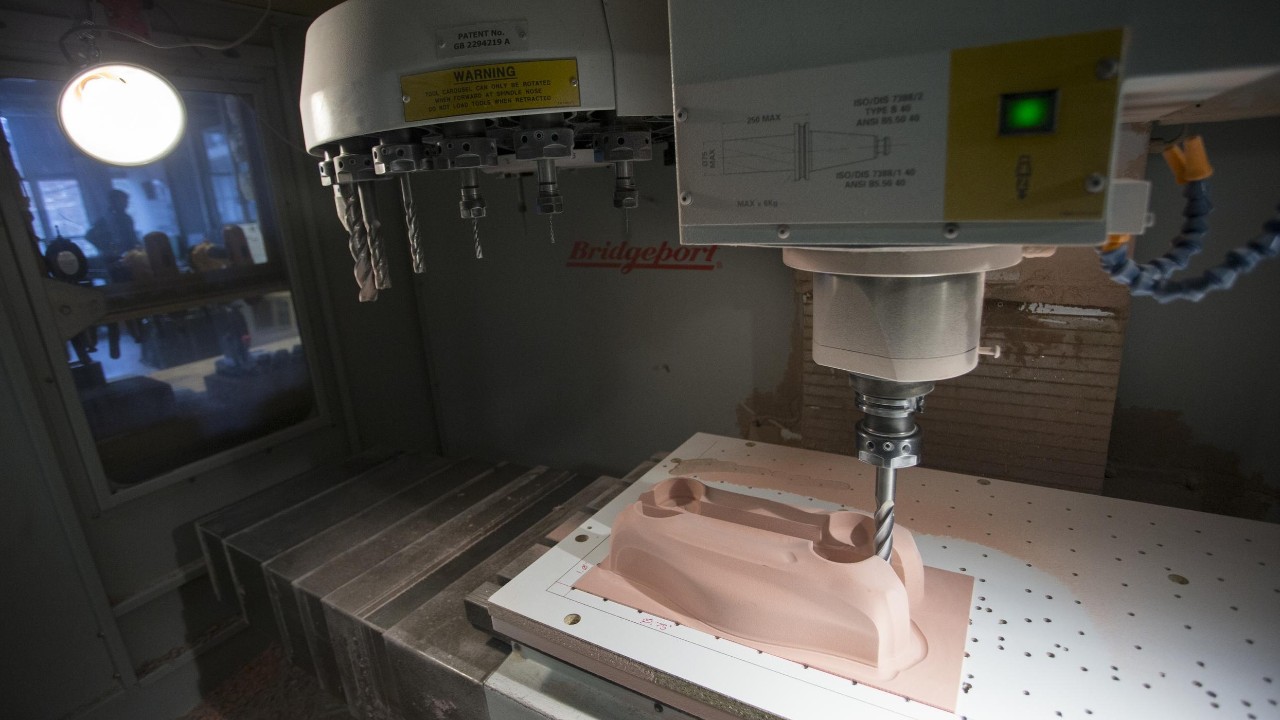
Rapid Prototyping Lab at DAAP.
Given all of this, a typical day in the life of a DAAP student often revolves around the studio, with classes scheduled in both the morning and afternoon. During that time, you might be refining your project, collaborating with classmates, heading to one of the on-site labs to build or prototype, or meeting with your instructor to discuss feedback and next steps. Studio classes alternate days, which usually leaves Fridays open—a valuable opportunity for students to catch up on work, collaborate, or simply take a break and enjoy campus life.


While DAAP offers countless amenities, tools, and labs for students to develop their projects, sometimes it is beneficial for students to break out of routine and explore new workspaces. When it comes to brainstorming or collaborating with other students, take a step outside of DAAP. Breaking out of the same scenery can help with the creative process and flow. So, when you have the chance, check out these campus options.
UC Libraries
The UC campus features several libraries that students can utilize for research, collaboration, studying, and exploration. Each library is equipped with resources including an online library catalog, video editing suites, computer workstations, and printers designed to enhance your learning experiences. They offer large spaces to work on projects and collaborate with your peers. You can find a library almost anywhere on campus. The most popular libraries due to their large spaces and many amenities include Langsam Library, CECH Library, and Classics Library. These libraries create the perfect atmosphere for quiet study, working with peers, and spacious areas to find your ideal workspace.
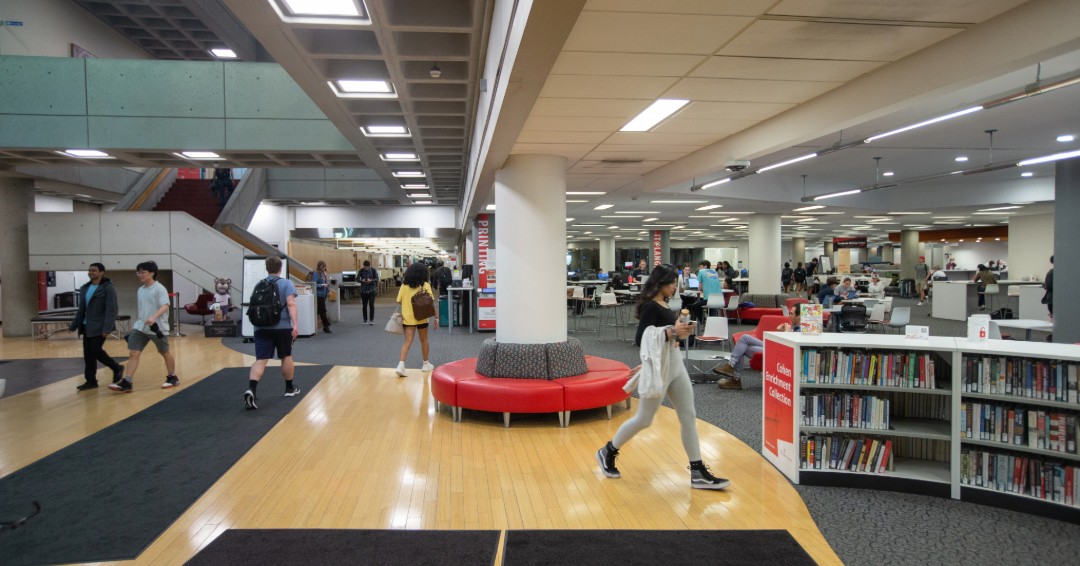
Students studying and working at Langsam Library.
Coffee Shops
All around UC, you can find a variety of coffee shops where you can work on projects or simply catch up with friends in a quiet setting. Coffee shops are great places for brainstorming with peers, sketching out ideas or prototypes, and designing on your computer. The UC campus has two 86 Coffee Bars, which are operated by student volunteers and offer a wide selection of coffee and workspaces. There is an 86 Coffee Bar located inside the CCM building and the other can be found just off campus by the Marian Spencer dorms. You can also find Rohs Street Cafe and Cincy Cafe nearby just off campus. These coffee shops also offer great workspaces to collaborate and design with a small group, along with many coffee and pastry options. Coffee shops provide excellent quiet spaces for productivity, enhanced by the sweet scents of coffee.
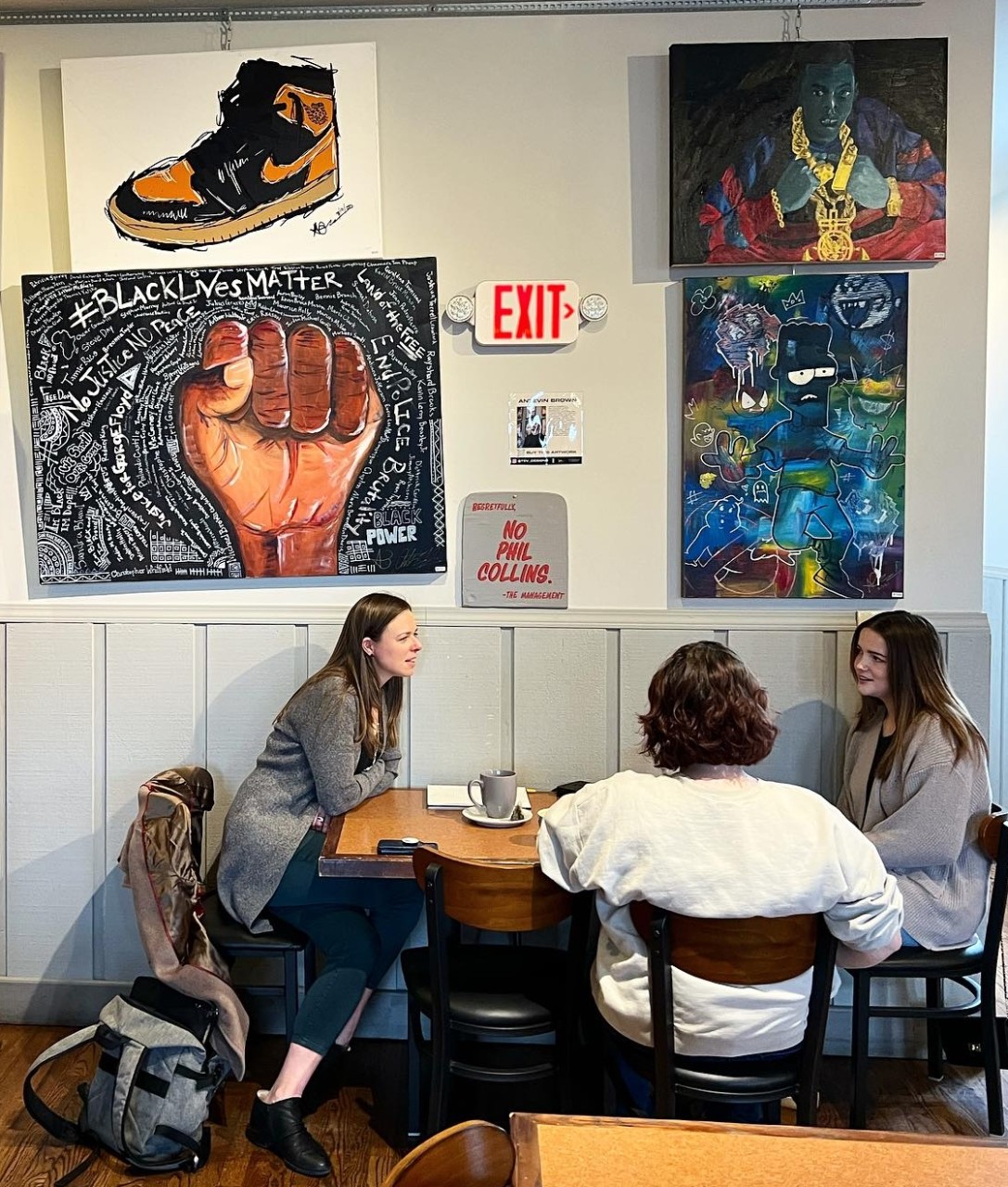
The 86 Coffee Bar. Photo take from @the86coffeebar.
Common Spaces
As a first-year student living in the dorms, every dorm includes a communal space in the lobby and on each floor. Sometimes, working in your room can feel a bit cramped, or you may prefer to work on projects and assignments outside of your personal space. The common areas in your dorm provide an excellent space to tackle your projects. These spaces offer a variety of tables, couches, and private desks for you to use. Some spaces even include a whiteboard to brainstorm ideas or draw prototypes. Common spaces are also great for working together with other students.

Student works on her assignment at the Calhoun common space.
Parks
Cincinnati is home to many beautiful parks with expansive landscapes and vibrant green spaces. These parks are located within a short walking distance from the UC campus. They provide great spaces for students to work on projects. Changing your scenery is an important part of the creative process, as it can help spark new ideas and perspectives. Take a step outside to enjoy some fresh air, lie on the grass to sketch, or meet up with friends to collaborate on projects and have a nice picnic. Some of the parks around UC that you can explore include Fairview Park, Bellevue Hill Park, and Inwood Park. Parks are also great places to take a break from working on your projects. Explore the park, relax in the sun, or play a game with your friends to recharge before getting back to your work.

Beautiful views and greenery at the park.
Spots Around Campus
There are countless spaces around UC’s campus, both indoors and outdoors, where you can work on projects. You can visit Mainstreet, where the atmosphere is lively, or, when there is no practice, relax on the bleachers at Nippert Stadium. Look for a comfortable spot at the Tangeman University Center or one of the many grassy areas outside. Sigma Sigma Commons is another great outdoor location with plenty of space and greenery. You can sit at a table or find a private area inside Clifton Court.
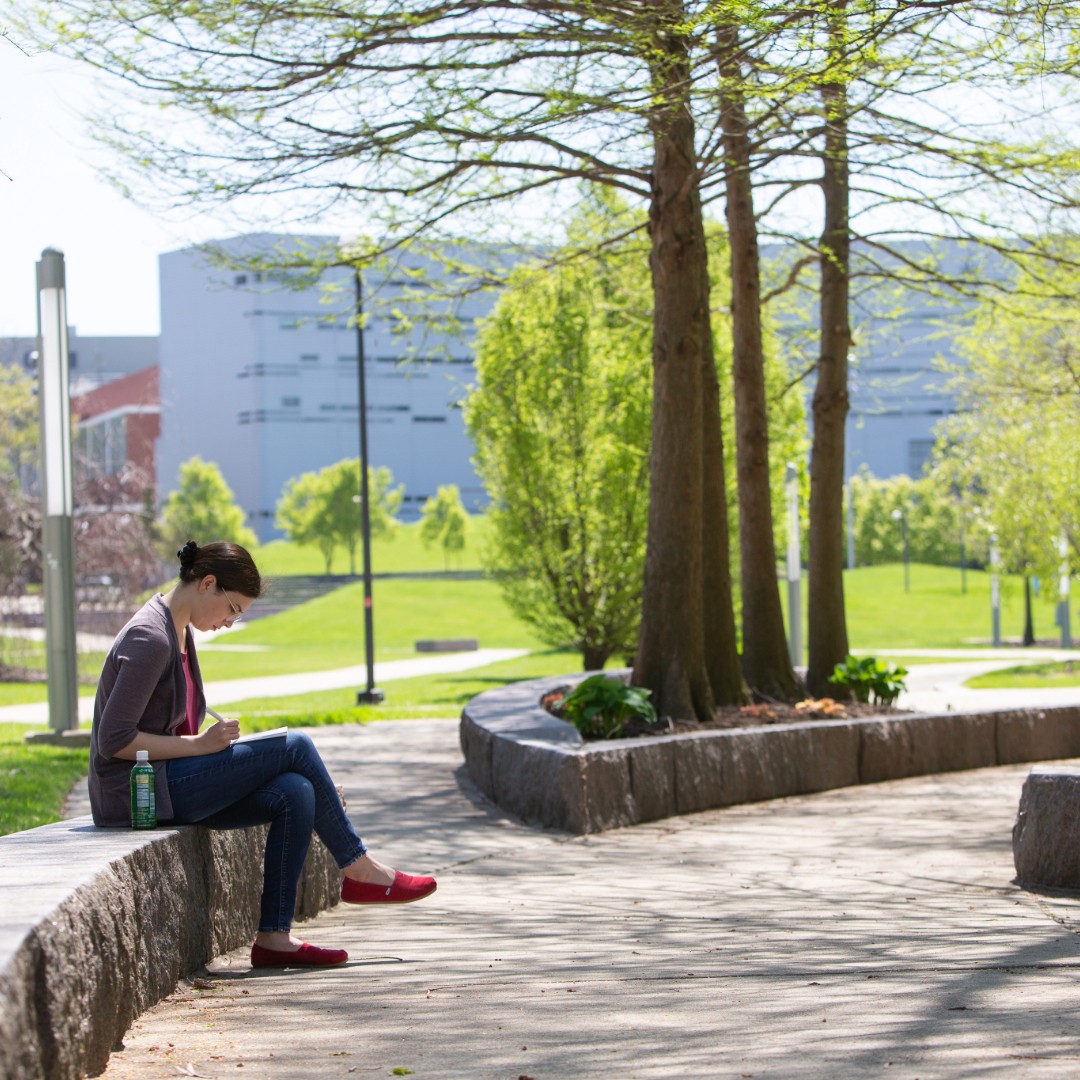
Student studying at Sigma Sigma Commons.
Take a step outside of DAAP and venture into the UC campus. UC is rich with vibrant areas and designated spaces for students to learn and study. Go and explore the abundant green spaces and unique buildings to find the perfect space to spark your creativity. This campus was designed to encourage exploration and curiosity. UC and Cincinnati are full of niche spaces for students to utilize.
At DAAP, creativity and exploration doesn’t just happen in the classroom. Throughout the year, students and the public are invited to dive deeper into the world of art, design, and innovation through various events, exhibitions, lectures, and workshops. These are opportunities to learn, connect, and be inspired.
Lecture
Lectures bring in influential professionals in art, design, and other related fields to the students and public. The college of DAAP plus each school hosts a lecture series, which is an opportunity to learn more about a specific field or other topics and ideas on a larger scale. These lectures give students a chance to hear and learn from professionals who share their insights, work, and experiences. Many of the lectures are recorded, so if you're unable to attend or interested in a prior lecture, you can watch it whenever and wherever. A highlight of the year is the Chatterjee Global Lecture Series, named in honor of former Dean Jay Chatterjee. This event is open to both students and the public, featuring internationally renowned speakers who explore how art and design shape our social and physical environments. These lectures aren’t just about listening to someone speak, but they spark real conversation. They challenge us to think critically, ask questions, and to explore new ideas.

Exhibitions
The University of Cincinnati is home to three remarkable galleries, the Reed Gallery located inside of DAAP, the Meyers Gallery, found on Mainstreet, and the Tabula Rasa Gallery managed by the School of Art students at DAAP. Both the Reed and Meyers galleries host numerous exhibitions throughout the year, both solo and group collections. The exhibitions showcase a wide variety of art styles and mediums, featuring work from professionals and students. The Tabula Rasa Gallery is where undergraduate and graduate students can showcase their recent work of that week. This gives them the opportunity to experience the art of curating. Open to everyone, these galleries offer a chance to explore new perspectives and a possibility to immerse yourself in the creative works of these artists.
Events
From major showcases to workshops, DAAP offers a wide range of events that promote community building and celebrate creativity. Some of these events include:
DAAPworks: An annual event that features the talent and creative work of the graduating class in all programs. This is an opportunity for them to showcase their hard work to an audience.
The DAAP Fashion Show: A runway event that displays the collections of the graduating fashion design students to a large audience.
EC2 DAAP Co-op and Career Fair: A networking opportunity for students to connect with employers through interviews and explore co-op and career pathways.
DAAPX: A celebration of alumni achievements that showcase a diverse range of projects and experiences across all backgrounds, majors, and degrees. This event features six presentations that explore experimental designs and creative projects.
Beyond these events, DAAP has an array of workshops throughout the year. These workshops include ceramics wheel throwing, block printing on textiles, color stone lithography, and so much more. Taught by professionals, these workshops are a chance to explore a new medium, refine your skills, and share your creative side.

